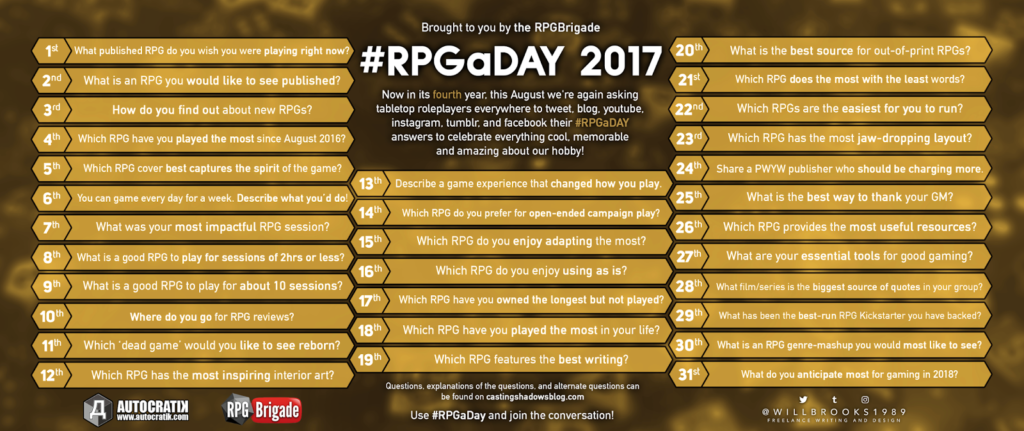This post is a part of the #RPGaDAY series for 2017 by David F. Chapman and RPGBrigade. For more information, see this post at AUTOCRATIK. I'm modifying per suggestions from S. John Ross as well as applying my own interpretations. Comment with your answers or links to your own posts!
Day 13 - Describe a game experience that changed how you play.
This is one of those times where I kinda wished I'd read ahead and done some planning. The first thing to come to mind was actually the story I related for Day 7, though I suppose that didn't necessarily change the way I play directly; it was more a memorable early experience in a long life of gaming. I like to think that I could take away a little something from every game, that the evolution of my playing style is just that -- an evolution -- and it took place as these things do in small increments over a long period of time.
This may be a cheat, but if there have been any quantum leaps in how I play, I like to think one of them happened the first time I read the rules to Apocalypse World. (And I'm also including GMing in this definition of "play.") A lot of gamers talk about how AW "just" codified a lot of techniques that they'd already been using, and there's certainly something to that, but even so, reading that ruleset and seeing all those things laid out was incredibly eye-opening for me. Failing forward, using conflict resolution rolls for entire scenes and not just as a turn-by-turn mechanic, the incredibly abstracted combat and damage system, the whole "play to find out what happens" principle... These are all things that spoke to me right through my little gamer heart. It's strange to even think about it at this point, but before that, I think that I had considered the story that emerges from a game to be something that was wrapped around the rules. The rules were there for you to play a game; a story was what emerged while you were playing it. AW really crystallized for me the idea that the rules can be used for the story, that generating the fiction was the game. Reading that game was me finding something I didn't even know I wanted. I often say that AW started a genuine revolution in game design, but for me personally, it also started a revolution in how I think about RPGs and, yes, how I run and play them.
The reason I call this a possible cheat is because I read the rules to AW long before I had a chance to play it. (I first became aware of the game via this newfangled entertainment form called "podcasts." Speaking of personal revolutions.) So, I imagine that the intent of this question was to ask about a gaming experience, but the answer I came up with was in its most literal form, a "game experience" -- not just an experience I had with a game, but the way I actually experienced a game. Only in this case, I'm talking about game in the sense of a book, a ruleset, and not a game in the sense of a session. (This hobby has a lot of ambiguous terminology, it turns out.) But whatever the case, I'm not losing sleep over it. AW opened me up to an entire new philosophy in both gaming and game design. I truly believe that it changed the face of the hobby itself, and I suppose that statement is legitimately up for debate. But I can state with certainty that it massively changed the hobby for me, and so, sure, I bet that changed the way I play.

